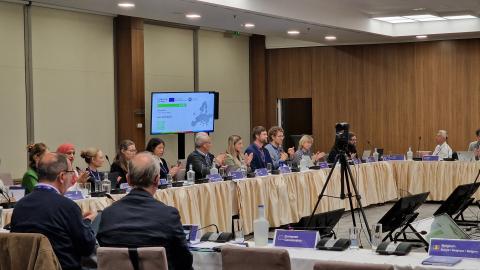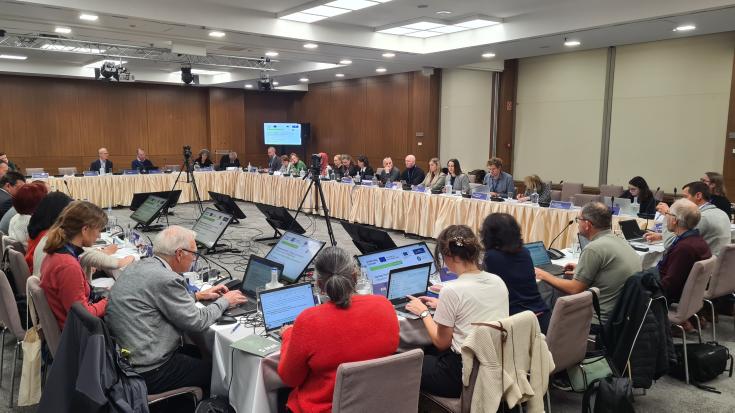Sharing RIWET insights with the EC Groundwater Working Group
On November 11-12 the University of Latvia attended the CIS-Groundwater Working Group Meeting together with the Latvian Environment, Geology and Meteorology Centre.
This meeting, a regular gathering of EU member states implementing the EU Water Framework Directive (WFD), serves as a key platform for discussing groundwater management and policy across Europe. Groundwater is vital – it sustains rivers and wetlands, is crucial for natural ecosystems and is a source of drinking water for 75% of Europeans.
The European Commission Groundwater Working Group
The Common Implementation Strategy (CIS) was launched in 2001 to facilitate the implementation of the WFD and its associated legislation. As part of this initiative, the CIS Groundwater Working Group was established to enable collaboration between member states, stakeholders, and the European Commission. Its focus lies in preventing and controlling groundwater pollution, ensuring good quantitative status, and protecting drinking water sources and dependent ecosystems, such as rivers and wetlands. The working group plays a key role in promoting mutual learning and sharing best practices among stakeholders, providing essential support for implementing complex policy tools like River Basin Management Plans (RBMPs).

River Basin Management Plans
The WFD requires EU member states to protect clean water bodies, restore degraded ones and prevent further deterioration of ecosystems, such as rivers and wetlands. Central to this effort are the River Basin Management Plans (RBMPs), the primary tool for WFD implementation and water status supervision in member states.
For the University of Latvia, RBMPs are a cornerstone of work within the RIWET project, where the aim is to raise awareness for the importance of groundwater in river and wetland protection and drinking water supply. Latvia also engages stakeholders in the RBMP development process. This event was an excellent opportunity to share the project’s best practices with key stakeholders from across Europe.
Sharing RIWET best practices
Inga Retike shared insights on Spring Monitoring: Filling Gaps in Groundwater Networks – Benefits and Bottlenecks. "We were honoured with this opportunity to give two 20-minute presentations as part of the meeting agenda," said Inga. "This presentation sparked significant interest among member states, particularly in the use of springs as a cost-effective alternative in the improvement of national and transboundary groundwater monitoring networks."
This use of springs as cost-effective tools for data collection in Latvia offers practical solutions for long-term water evaluations. Our RIWET partner's succes in engaging communities through citizen science to map springs was greatly admired. By actively involving stakeholders, they demonstrate how such engagement drives smarter water management decisions while also raising awareness regarding the essential role of groundwater in supporting rivers and wetlands.
Assessing groundwater drought in the Baltic
Inga's colleague, Jānis Bikše presented Groundwater Drought Exploration Using Groundwater Memory Effect and Machine Learning in the Baltic Countries, explaining how groundwater droughts are assessed in the region. He highlighted challenges with data quality and consistency and discussed using machine learning tools to model groundwater droughts. Results show that the river network plays a key role in drought development, which emphasizes the strong connection between groundwater, surface water, and wetlands as a joint system. This interconnected approach aligns closely with emerging EU priorities, such as addressing climate change effectively.
New knowledge and future priorities
"The meeting provided a wealth of new information, particularly about future priorities for groundwater protection in Europe," Jānis explained. "There was a strong focus on contributing to the EU Green Deal’s mission to tackle the triple crisis: climate change, biodiversity loss, and pollution."
The CIS Groundwater Working Group outlined tasks for the upcoming 2025-2027 period, including:
- Prioritizing substances to address water quality concerns
- Improving assessments of quantitative status, ensuring sustainable resource use
- Enhancing policy coordination with groups focusing on drinking water and nitrates
- Exchanging best practices for groundwater remediation to mitigate pollution impacts
These priorities reflect Europe’s commitment to addressing pressing challenges while ensuring sustainable groundwater management.
Final thoughts
Attending the CIS meeting was a valuable opportunity to connect with experts, share insights from the RIWET project, and learn from best practices across Europe. Looking ahead, the new knowledge will allow alignment of future actions with emerging EU priorities. Groundwater may not be visible, but its impact on ecosystems and water security is undeniable. Together, we can ensure its sustainable management for generations to come.

